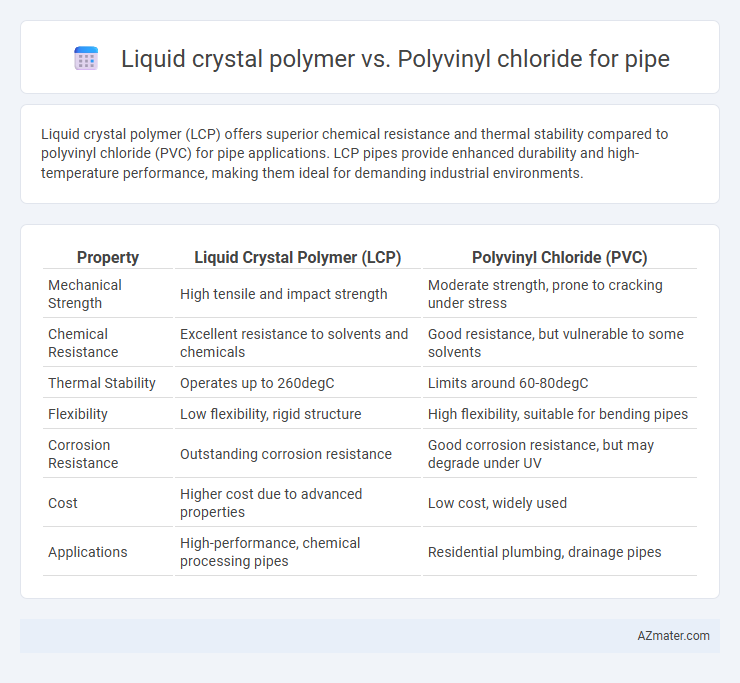Liquid crystal polymer (LCP) offers superior chemical resistance and thermal stability compared to polyvinyl chloride (PVC) for pipe applications. LCP pipes provide enhanced durability and high-temperature performance, making them ideal for demanding industrial environments.
Table of Comparison
| Property | Liquid Crystal Polymer (LCP) | Polyvinyl Chloride (PVC) |
|---|---|---|
| Mechanical Strength | High tensile and impact strength | Moderate strength, prone to cracking under stress |
| Chemical Resistance | Excellent resistance to solvents and chemicals | Good resistance, but vulnerable to some solvents |
| Thermal Stability | Operates up to 260degC | Limits around 60-80degC |
| Flexibility | Low flexibility, rigid structure | High flexibility, suitable for bending pipes |
| Corrosion Resistance | Outstanding corrosion resistance | Good corrosion resistance, but may degrade under UV |
| Cost | Higher cost due to advanced properties | Low cost, widely used |
| Applications | High-performance, chemical processing pipes | Residential plumbing, drainage pipes |
Introduction to Liquid Crystal Polymer and Polyvinyl Chloride Pipes
Liquid Crystal Polymer (LCP) pipes offer exceptional chemical resistance, high-temperature stability up to 260degC, and superior mechanical strength, making them ideal for demanding industrial applications. Polyvinyl Chloride (PVC) pipes, widely used in plumbing and drainage systems, provide durability, corrosion resistance, and cost-effectiveness with a typical temperature rating of up to 60degC. While LCP pipes excel in specialized environments requiring high-performance materials, PVC remains a popular choice for general-purpose piping due to its versatility and ease of installation.
Chemical Composition and Structure Comparison
Liquid crystal polymer (LCP) features a highly ordered, rigid molecular structure with aromatic polyesters aligned in a liquid crystalline phase, providing exceptional thermal stability and chemical resistance. Polyvinyl chloride (PVC) consists of polymerized vinyl chloride monomers with a linear, amorphous structure that includes chlorine atoms, offering good chemical resistance but lower thermal tolerance. The aromatic and crystalline nature of LCP results in superior mechanical strength and chemical inertness compared to the chlorinated, less ordered PVC structure commonly used in general-purpose piping.
Mechanical Strength and Durability
Liquid crystal polymer (LCP) pipes exhibit superior mechanical strength and enhanced durability compared to polyvinyl chloride (PVC) pipes, making them ideal for high-stress applications. LCP's inherent molecular alignment provides exceptional tensile strength, impact resistance, and thermal stability, outperforming PVC in harsh environments. PVC pipes offer adequate durability for standard plumbing but lack the mechanical robustness and longevity of LCP under extreme mechanical and thermal conditions.
Thermal Resistance and Performance in Extreme Temperatures
Liquid crystal polymer (LCP) exhibits superior thermal resistance compared to polyvinyl chloride (PVC), maintaining structural integrity at temperatures exceeding 260degC, whereas PVC typically degrades around 60-80degC. LCP's exceptional performance in extreme temperatures makes it ideal for applications requiring durability under high heat and thermal cycling, while PVC is more suited for moderate temperature environments due to its lower melting point and thermal stability. The enhanced thermal endurance of LCP ensures minimal deformation and prolonged lifespan in demanding conditions, outperforming PVC in harsh industrial and automotive pipe systems.
Chemical Resistance and Corrosion Protection
Liquid crystal polymer (LCP) exhibits superior chemical resistance and corrosion protection compared to polyvinyl chloride (PVC), making it ideal for harsh chemical environments. LCP maintains structural integrity and resists aggressive solvents, acids, and alkalis, while PVC can degrade or become brittle when exposed to strong chemicals. This enhanced durability of LCP reduces maintenance costs and extends the lifespan of pipes in industrial applications.
Installation Methods and Process Differences
Liquid crystal polymer (LCP) pipes require precision in installation, often necessitating specialized fusion techniques or mechanical fittings to maintain their high-temperature resistance and chemical stability, whereas polyvinyl chloride (PVC) pipes typically allow for solvent welding and simpler mechanical joints suitable for lower temperature applications. The installation of LCP pipes demands strict adherence to manufacturer guidelines to preserve their structural integrity, while PVC pipes offer more flexibility in cutting, joining, and handling during the installation process. LCP's resistance to deformation under stress contrasts with PVC's vulnerability to temperature and chemical softening, influencing the choice of installation methods based on project environment and performance requirements.
Cost Analysis: LCP vs PVC Pipes
Liquid crystal polymer (LCP) pipes generally incur higher initial costs compared to polyvinyl chloride (PVC) pipes due to advanced manufacturing and superior material properties. PVC pipes offer a cost-effective solution with lower raw material and installation expenses, making them suitable for large-scale, budget-sensitive projects. Despite the higher price, LCP pipes provide increased chemical resistance and durability, potentially reducing long-term maintenance and replacement costs.
Environmental Impact and Sustainability
Liquid crystal polymer (LCP) pipes offer superior environmental sustainability compared to polyvinyl chloride (PVC) pipes due to their higher durability and chemical resistance, leading to longer service life and reduced material waste. LCP is often more recyclable and generates fewer toxic emissions during manufacturing and disposal, whereas PVC production releases harmful dioxins and other pollutants detrimental to ecosystems. The lower environmental footprint of LCP in terms of energy consumption and potential for recycling makes it a preferable choice for sustainable piping solutions.
Typical Applications in Industry
Liquid crystal polymer (LCP) is commonly used in high-performance industrial applications such as automotive fuel lines, electrical connectors, and medical devices due to its excellent chemical resistance, high-temperature tolerance, and dimensional stability. Polyvinyl chloride (PVC) is widely employed in plumbing, irrigation, and electrical conduit systems, valued for its cost-effectiveness, ease of installation, and corrosion resistance. The choice between LCP and PVC depends on the specific industry requirement for thermal endurance, mechanical strength, and chemical exposure.
Conclusion: Choosing the Right Material for Piping Systems
Liquid crystal polymer (LCP) offers superior chemical resistance, high temperature tolerance, and exceptional mechanical strength, making it ideal for demanding industrial piping systems. Polyvinyl chloride (PVC) remains cost-effective, easy to install, and corrosion-resistant, suited for standard residential and commercial applications. Selecting between LCP and PVC depends on the specific environmental conditions, pressure requirements, and budget constraints of the piping project.

Infographic: Liquid crystal polymer vs Polyvinyl chloride for Pipe
 azmater.com
azmater.com